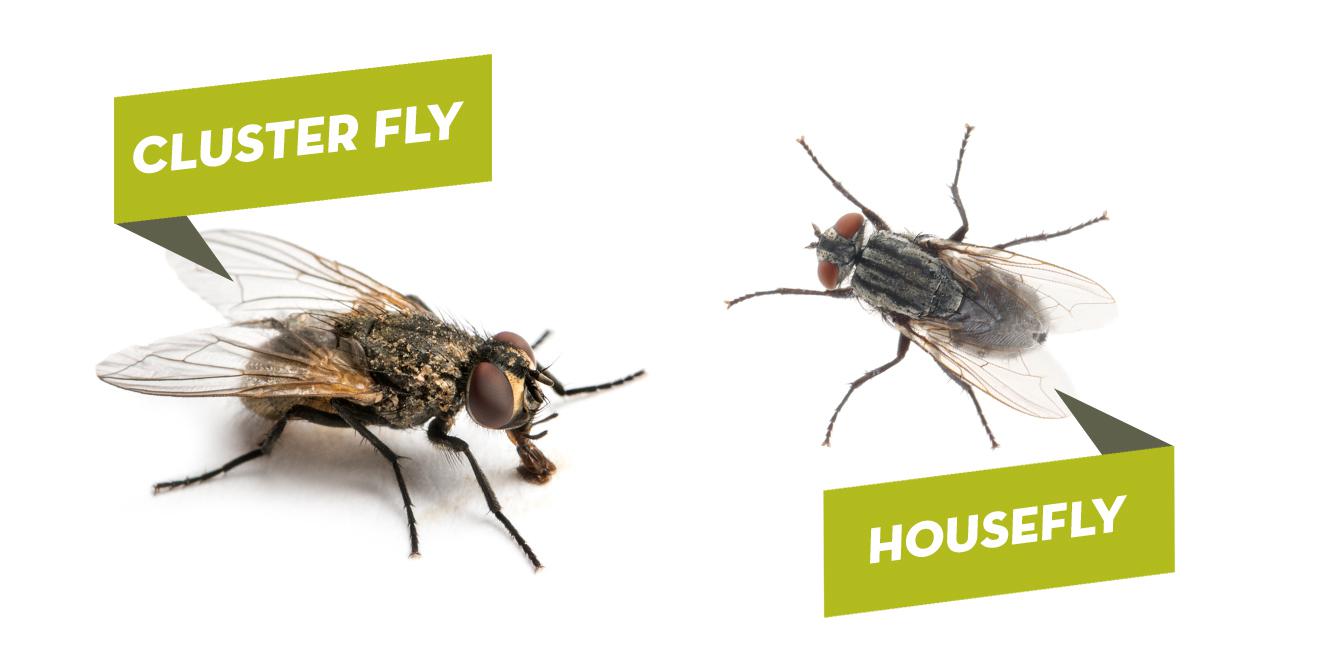Houseflies vs. Cluster Flies – The Jekyll and Hyde of Flies Inside
Posted by Mosquito Squad
August 5, 2024

No one wants to hear the buzzing of flies inside a house! Flies can be both a bother and a health hazard. But, to get rid of flies inside, you’ll need to understand what flies are sneaking in. Two common flies that come inside are cluster flies and houseflies. With their distinct back markings and relatively small size, cluster flies and houseflies are often mistaken for one another.
While similar in appearance, these flies have very different behaviors and require different deterrents.
Quick Identifiers: How to Tell If It’s a Cluster Fly or Housefly
A housefly:
- Small, usually 1/8 to 1/4 inch long.
- Gray-black body with four dark stripes along the back.
- Red eyes.
- Dark hairs.
- Quick and erratic flying and buzzing.
- Solitary or in small groups.
A cluster fly:
- A bit bigger, typically 1/3 of an inch long.
- A brown-black body with a checkered silver pattern.
- Reddish-brown eyes.
- Golden hairs.
- Slow and sluggish flying and buzzing.
- Often in large groups.
What Attracts Cluster Flies and Houseflies to Your Home?
Cluster flies are attracted to warm and sheltered places where they can hibernate when it gets cold outside. This means they’re largely a nuisance in the fall and winter months. You'll likely find cluster flies gathered in empty rooms around windows or in attics and wall cavities.
Houseflies will be wherever they can find food and water, like kitchens and bathrooms. While houseflies can be a nuisance all year round, they are especially active during the warmer months and thrive in areas with easy access to food and waste.
Cluster Flies vs. Houseflies – Which is More Hazardous?
Houseflies are notorious for spreading diseases, as they pick up germs from garbage and other unsanitary sources, transferring them to human food and surfaces. This can lead to illnesses, such as food poisoning and typhoid fever. They also lay eggs in decaying organic matter, which can be a health hazard.
While cluster flies are also a bother, they’re much less of an immediate health concern. Cluster flies breed outdoors near earthworm burrows where their larvae can then parasitize the worms; therefore, they don't reproduce inside but just come inside to hibernate during the winter. Although cluster flies are not known to spread diseases, they tend to travel in groups, and their dead bodies can attract other pests.
How Long Do Houseflies Live?
Houseflies have a lifespan of about 15 to 30 days, but this can vary depending on environmental conditions, such as temperature and the availability of food. Although they have a relatively short life, female houseflies can lay hundreds of eggs in their lifetime, quickly increasing your indoor housefly problem.
How Long Do Cluster Flies Live?
While most cluster flies live one to three months, if they can find the right hibernation conditions to survive winter, they can live up to two years!
How to Get Rid of Cluster Flies and Houseflies
At-home methods, such as sticky flypaper and DIY fly traps can be used to eliminate flies inside. Place flypaper along windowsills or near garbage cans where the pest is likely to land. Create a fly trap by placing a piece of fruit or apple cider vinegar in a tall cup with water and a little bit of dish soap. When a fly lands on the water, the dish soap will prevent them from being able to fly out. This method is especially effective against houseflies.
To get rid of cluster flies, spray a household cleaner in the general area. When the product gets on their wings it will prevent them from flying, and they will eventually die. For your safety, we recommend using a natural and non-toxic cleaner. Promptly vacuum or clean up the dead flies to avoid attracting other pests.
Related Blog: Where Do Gnats Come From?
How to Prevent Flies in the House
Plant natural repellents, such as basil, mint, or lavender near windows and doors; their strong scents deter both types of flies. Inspect exterior walls for potential entry points, repair cracks or gaps in windows and doors, and repair or install window screens to help prevent flies from entering.
If you're dealing with houseflies, focus on sanitation and keeping food covered: Regularly clean kitchen counters, floors, and appliances to remove food residues. Dispose of garbage promptly and use tightly sealed bins. Ensure pet waste is cleaned up outside and not left to linger in litter boxes. Rinse out garbage disposals to avoid food buildup in drains.
The best way to avoid a fly infestation is with a professional preventative fly treatment.
Mosquito Squad’s fly control service uses our traditional barrier treatment spray to kill flies on contact and then continue to deter them for up to 21 days! Our professionals can treat the perimeter of your home to help prevent flies from entering.
Get Flies to Buzz off – for Good!
Flies inside are a nuisance. Luckily, you can be prepared for any flies that may come your way with help from the pest pros at your local Mosquito Squad! Request a quote online or call our team at (877) 332-2239 to get started.
